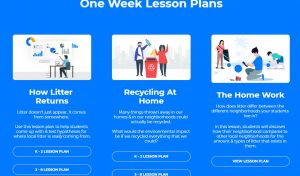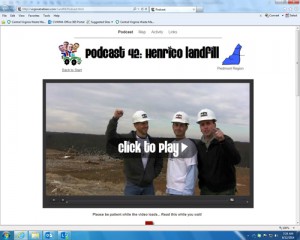How Stuff Works- Recycling Aluminum – watch video.
- The Lifecycle of a Plastic Water Bottle: Watch video
- Mohawk’s Video: Everstrand Bottle to Carpet (Permission by Mohawk)
- The Sounds of Recycling: What Will Your Carton Become?: Watch video (Permission by Carton Council)
- Fast Food (K-12 Lesson Plans). Discover how much litter gets created by fast food packaging that people buy every day where you live. What solutions can you come up with to reduce waste created by packaging?
- What is Litter? After a litter cleanup, use the Litterati App tagging function to learn about different categories of litter and the difference between litter vs. waste. Check out the Litterati app challenges K-12, too.
- Creative Writing: Every piece of litter has a story.
- These resources are designed for school, classroom, home school, or self directed learning. Visit http://edu.litterati.org/
Podcast #17 is a partnership with TFC Recycling and CVWMA lets you see firsthand how items collected at the curb or a CVWMA drop-off collection site are taken to a local “MRF” (Materials Recovery Facility) to be sorted and processed so that new materials can be made from recyclables. (Note: CVWMA now accepts more items than we did when this video was made.)
View Virginia Trekkers Podcast # 17 (Recycling)
Podcast # 42 and its companion Journey Through a Landfill activity guide is a partnership with CVWMA, Henrico County Department of Public Utilities/Division of Solid Waste and Recycling, and Keep Henrico Beautiful. The Virginia Trekkers will show viewers what happens to your trash after you throw it in the garbage can/cart. See where all it goes!
Students can see where their garbage goes as well as what items could be recycled. No one really knows if glass takes a million years to decompose. It is an educated guess. By doing this exercise with relative decompostion times, students will create a visual representation of the time it takes for various waste items left in a landfill to breakdown or decompose. It will get them to start thinking about all of their “stuff”. Discover how trash is turned into electricity and learn what you can do to reduce the amount of garbage/trash you send to the landfill. It’s an exciting place with lots to explore! Don’t miss the Trekkers interactive “Building a Landfill” activity as well as the phethora of educational links provided at the top header of the Podcast.
-
You must register in order to download the curriculum. Great free educational video: What’s One Can?
-
ABCs of EE for grades 4-6
-
Talkin’ Trash with ABCs for grades 6-9
-
Cans: Infinitely Recycable for High School students


